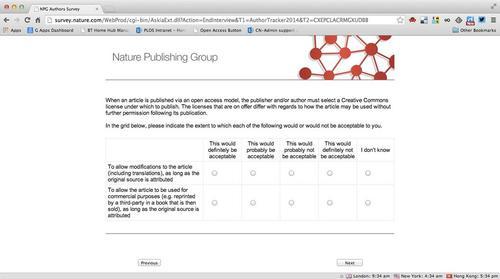Neylon highlights another misleading survey - this one from NPG
Thanks to this tweet by @CameronNeylon we see a very loaded question about Open Access licensing consequences from NPG. I should say also that there are a few other misleading questions from this NPG survey - which look to be as much as propaganda as (poorly designed) survey material.

This seems to be the new scare tactic for anti-OA activists. Explain one possible commercial use case, one likely to offend or upset academics, while neglecting to state the many other reasons one would want to allow commercial re-use: teaching in academic situations (if the academic is paid that’s commercial use), text/data mining for new cures, in certain cases physician’s may hesitate to use or cite the research after developing new tools based on that information, etc.
Maybe you have a moral reason to not want a biopharma giant to profit off of your Open Access article. Fine, fair enough, but that actually doesn’t prevent them from using the information - facts can’t be copyrighted. More often than not, the use of a Non-Commercial OA license (e.g. CC-BY-NC) has the opposite effect from what the author hoped to achieve. Peter Murray Rust explains this in an excellent writeup here. An NC license doesn’t prevent the publisher you use from profiting off of the material, it won’t stop pharmaceutical companies, but it does deter others with many legitimate use cases.
Had all software development in the early days of the 60s, 70s, and 80s restricted commercial use then we wouldn’t be here today discussing this. Open licensing with explicit reuse for commercial interests has been the foundation of software that powers a majority of the world’s websites, and software that powers research activity in academic institutions. The parallels with Open Access articles and the early days of open sourced software are massive.
For sure, all academics should be aware of the possible uses of their research, but the point is to make them fully aware of all use cases, not just a select few intended to scare. And we also need to understand that choosing a restrictive NC license may have unintended consequences as well.
Updated to add: Many, including the Budapest Open Access initiative, do not consider OA licenses with an NC clause to actually be Open Access. I agree with this position.